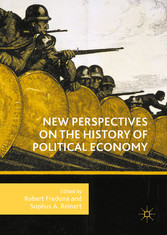Suchen und Finden
Contents
5
Editors and Contributors
8
Introduction: History and Political Economy
10
Genoa, Liguria, and the Regional Development of Medieval Public Debt
32
What Were the Compere?
34
Communal Debt, Regional Subjects, Taxation, and Membership
39
Fiscal Change and Regional Dynamics
48
Angelo degli Ubaldi and the Gulf of the Venetians: Custom, Commerce, and the Control of the Sea Before Grotius
60
Capitalism and the Special Economic Zone, 1590–2014
105
Regional Competition and the Free Port System of Early Modern Italy
107
Administrative Relimitation and Contemporary Capitalism
113
Special Zones, Special Interests
121
Theatrum Œconomicum: Anders Berch and the Dramatization of the Swedish Improvement Discourse
133
Introduction
133
The Swedish Improvement Discourse
135
Anders Berch
137
Introduction to General Householding
140
Theatrum Œconomicum
146
Conclusion
153
Gulliver’s Travels, Party Politics, and Empire
161
I
164
II
167
III
170
IV
176
V
181
VI
186
Commerce, not Conquest: Political Economic Thought in the French Indies Company, 1719–1769
200
Ideological Foundations: John Law’s Geopolitics
205
Law’s Ideological Legacy
210
The Geopolitics of the Compagnie des Indes
214
Commerce and Conquest in the Final Years of the Company
219
Conclusion: The Compagnie des Indes in the History of Political Economy
223
The Economics of the Antipodes: French Naval Exploration, Trade, and Empire in the Eighteenth Century
232
Antipodean Economics: The Two Models
235
Free Trade or Aggression? Bougainville and Lapérouse in Asia
240
An Export Colony or a Subsistence Colony? Poivre and Expeditions to the South Seas
245
Conclusion
254
A “Surreptitious Introduction”: Opium Smuggling and Colonial State Formation in Late Nineteenth-Century Bengal and Burma
261
Imperial Opium and Excise Taxation
264
What Causes Contraband (in Bengal)
268
What Causes Contraband (in Burma)
270
A Place in the Sun: Rethinking the Political Economy of German Overseas Expansion and Navalism Before the Great War
281
The Political Economy of Weltpolitik Around 1900
284
Lessons from Venezuela and the Philippines
289
Farmers and Frontiers
293
Hamilton, List and the Heritage of “Whig” Political Economy
296
Conclusion
306
Wesley Mitchell’s Business Cycles After 100 Years
317
Mitchell
320
Business Cycles
322
The Term “Business Cycles”
326
Economists and Statisticians
329
Entrepreneurs and Forecasters
332
Politicians
336
Conclusion
338
On a Certain Blindness in Economic Theory: Keynes’s Giraffes and the Ordinary Textuality of Economic Ideas
347
Ways of Seeing Knowledge and Blindness
347
Regression and the Herd
349
All Animals Are Equal, Some More Than Others
353
By Way of Concluding: Or the Case of the Disappearing Giraffe
364
Between Economic Planning and Market Competition: Institutional Law and Economics in the US
376
Interwar Institutional Economics
378
Social Control and the Administrative State
382
Academic Experts and Intermediary Organizations
387
Punishment, Political Economy, and the Genealogy of Morals
401
Introduction
401
Epilogue
419
Index
424
Alle Preise verstehen sich inklusive der gesetzlichen MwSt.













